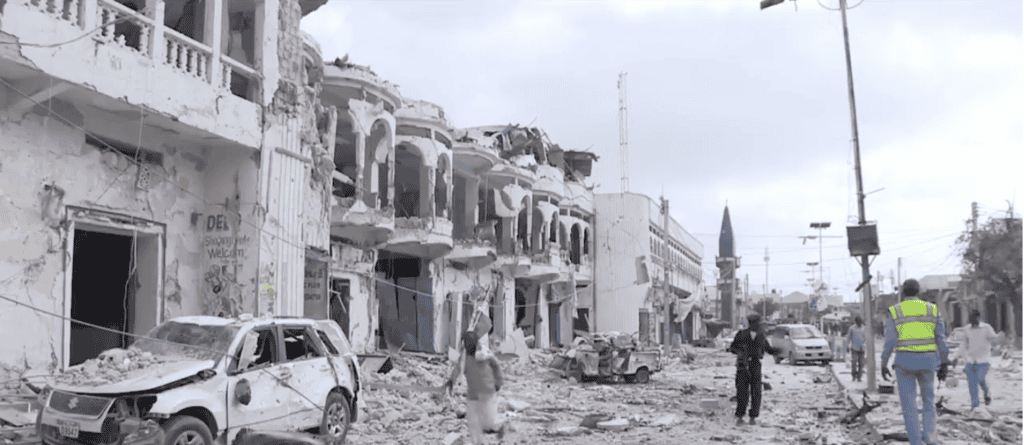
Scene outside Mogadishu’s Dayah Hotel after the blast. (Al Jazeera)
Al Qaeda’s branch in East Africa, Shabaab, continues to prove its ability to penetrate and attack high-security areas in central Mogadishu, the capital of Somalia. The jihadist group killed at least 28 people in a suicide assault earlier today at a popular hotel near Somalia’s parliament building.
Shabaab’s Shahada News Agency said in a statement on Telegram that “two powerful explosions targeted the Dayah Hotel in central Mogadishu.” The statement continued that “violent clashes” then occurred after Shabaab “commandos” breached the hotel’s perimeter. In a separate statement, Shabaab claimed its forces killed and wounded more than 100 people, but that number seems to exaggerate reports from independent sources.
The first suicide car bomb detonated this morning after it rammed into the hotel’s main gate, which made it possible for Shabaab’s fighters to enter the hotel and engage security guards. A second car bomb exploded as security and medical personnel, as well as reporters, gathered at the scene. The AFP reported that one of its photojournalists, a reporter from AP, and another from Al Jazeera were wounded in the second blast.
The suicide raid, or coordinated attack using one or more suicide bombers and sometimes a follow-up assault team, is a tactic frequently used by al Qaeda and its branches, as well as allied groups such as the Afghan Taliban, the Movement of the Taliban in Pakistan, Lashkar-e-Taiba, and the Islamic Movement of Uzbekistan. The Islamic State also often employs this maneuver.
The strategy is a common one used by Shabaab in its regular invasions on hotels and areas frequented by Somali dignitaries and Westerners. Last January, Shabaab launched an attack on the Beach View Hotel on Lido Beach, killing over 20 people. A month later, Shabaab targeted the Somali Youth League (SYL) Hotel in Mogadishu, killing nine. The same hotel was targeted in 2015 when Shabaab claimed credit for a bombing at the hotel that killed three people. The offensive took place as Turkish President Recep Tayyip Erdogan and a delegation were at the hotel.
Last June, Shabaab killed 13 in an assault on the Ambassador’s Hotel, including two Somali members of parliament. In Nov. 2015, Shabaab raided the Al Sahafi hotel. The attack, which began with two vehicle-borne improvised explosive devices (VBIEDs, or car bombs) before an assault team entered the breached perimeter, left at least 15 dead. In July 2015, Shabaab killed more than 10 people after storming the Jazeera Hotel.
This was not the first time the Jazeera Hotel was targeted by the jihadist group. Shabaab also hit the hotel in January 2014 and September 2012; Somalia’s president and Kenya’s foreign minister were present during the 2012 strike, but they were not injured.
In March 2015, the jihadist group stormed another hotel and briefly seized control of it before the attackers were killed by security forces. One month earlier, a suicide assault team hit the Central Hotel, a gathering place for Somali parliamentarians and other members of government, killing several senior Somali politicians.
Attacks like these are designed to demonstrate that the jihadist group, despite a large presence of African Union forces, retains the ability to strike in these high-security areas. Since 2014, Shabaab has attacked the parliament, the president’s compound, and a high security intelligence headquarters. In June 2013, a Shabaab team struck at the United Nations Development Program (UNDP) compound in Mogadishu; several UNDP employees were killed and the jihadist group briefly took over the compound. And in 2010, Shabaab was even able to launch a suicide assault on an African Union medical clinic in the Mogadishu airport.








3 Comments
Glad they cleared that up that the picture was AFTER the blast and not before.
would love to own a used car lot in that area! biz is boooooooooooommmmmming!
Back to Baidoa?
Is Mogadishu Airport even safe?
Did they ever find the guy who made those laptop bombs?